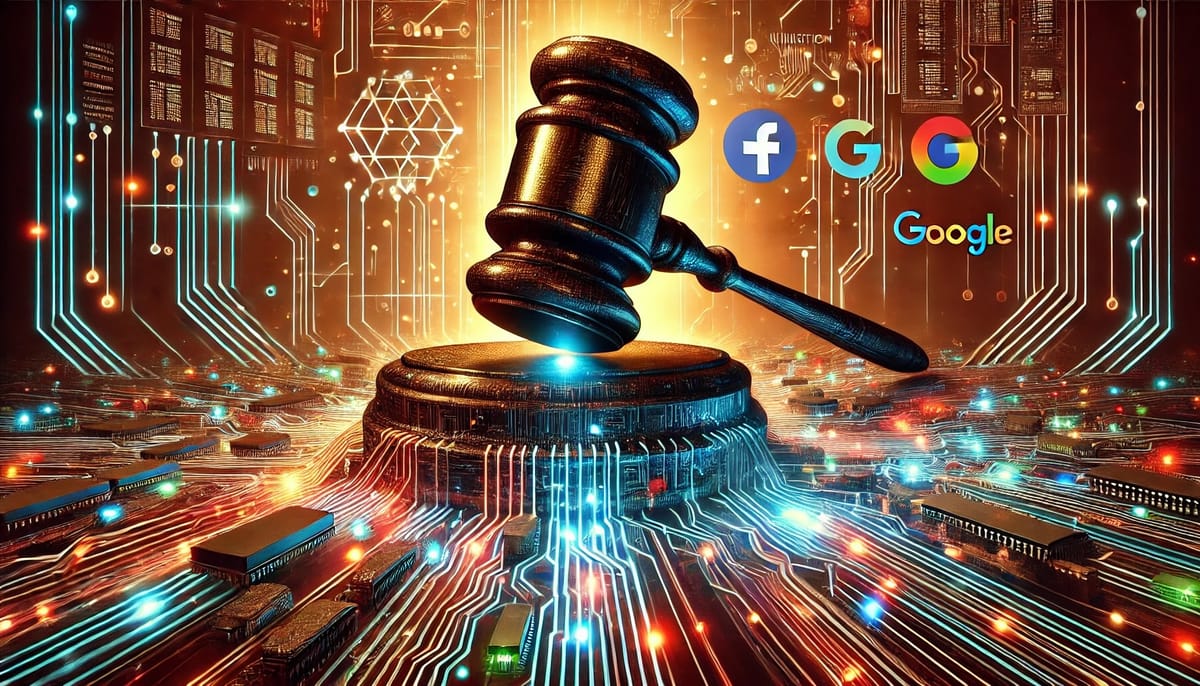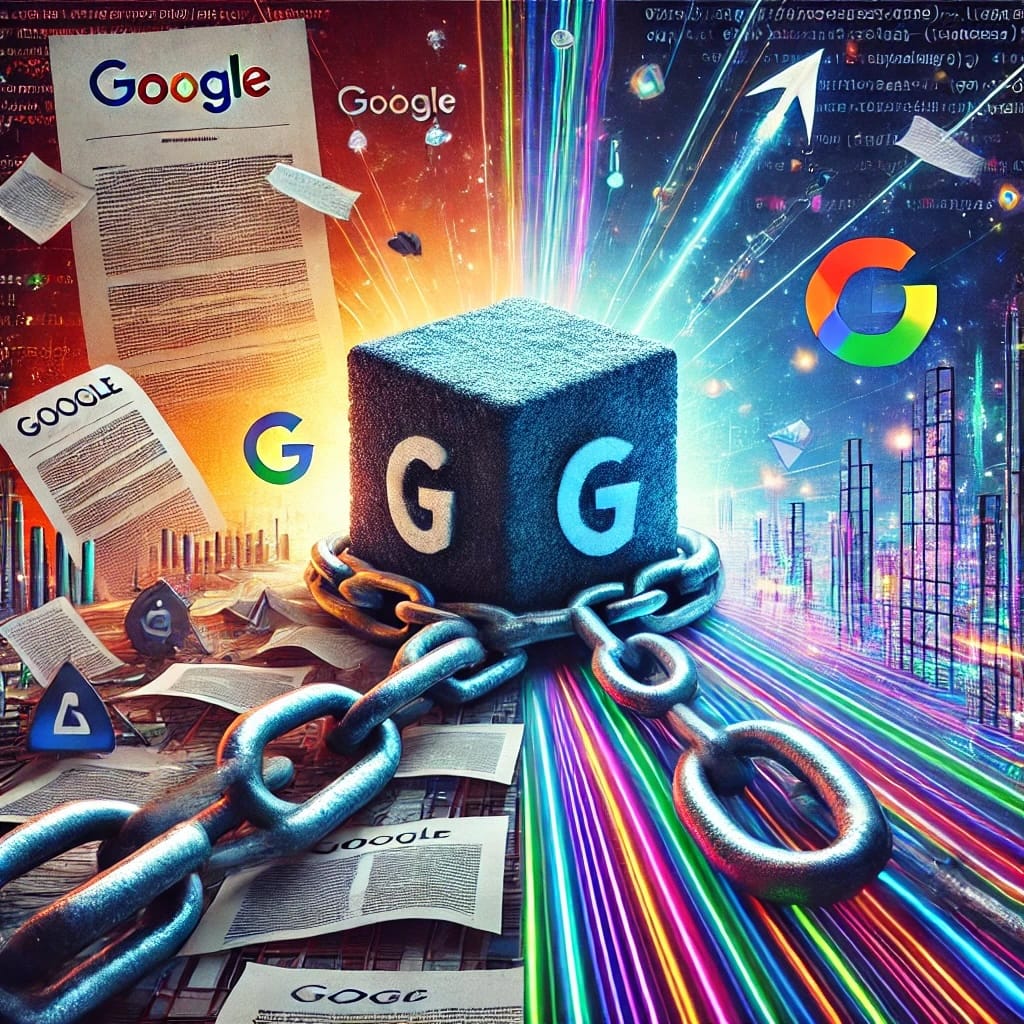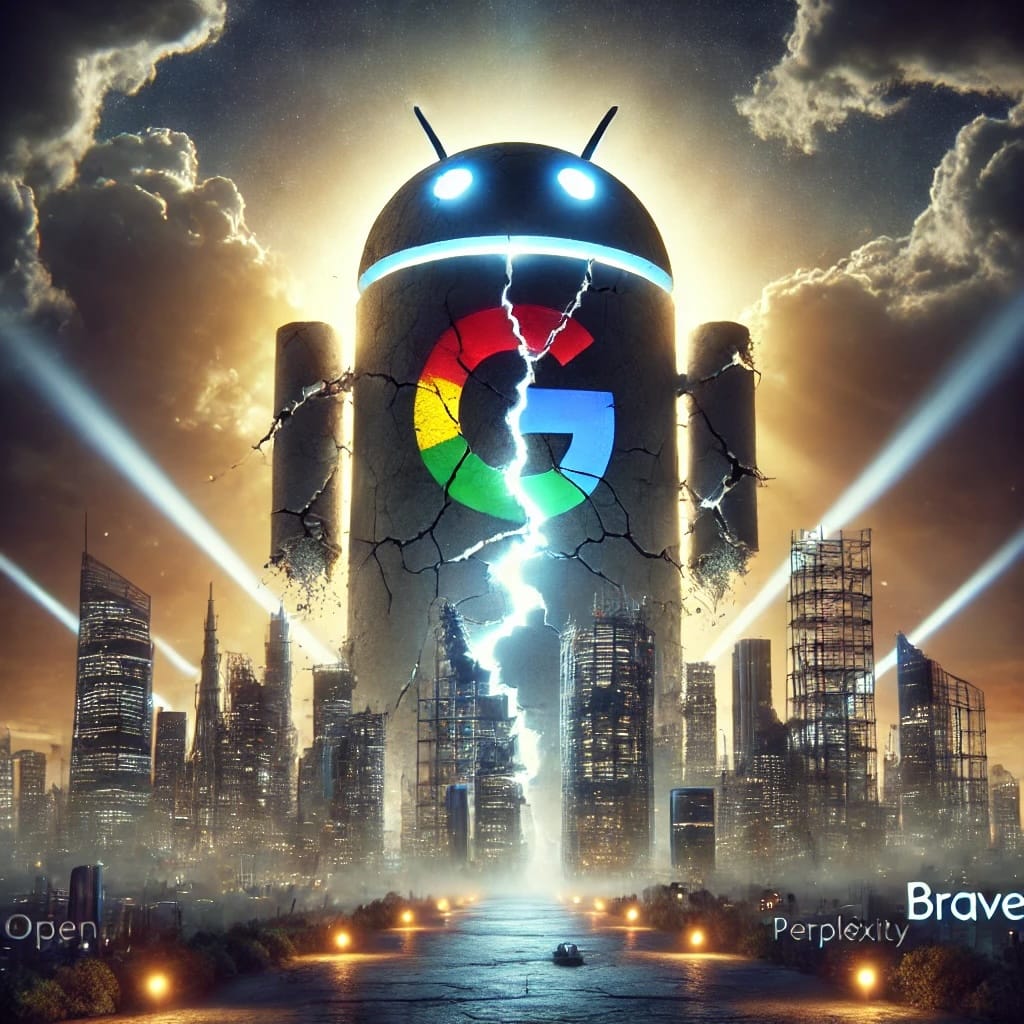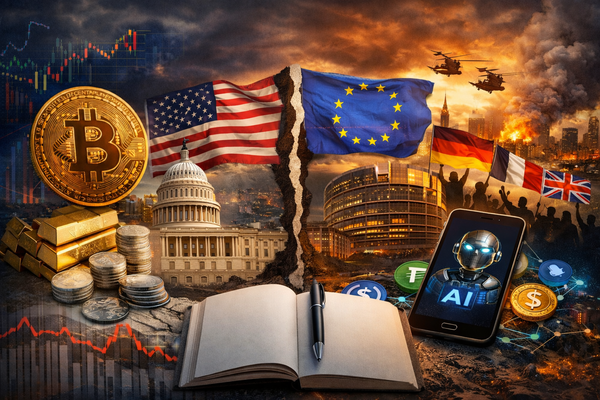Antitrust in Tech: A Case for the Government to Stay out of it
What are we gaining for these drawn-out legal battles?

A recent court ruling has thrust Google into the spotlight, sparking debate about its monopoly market position. The ruling centers on Google's deals over the last decade with device manufacturers, such as Apple and Samsung, which set Google as the default search engine on those devices operating systems. The court deemed these deals illegal because they argued they entrenched Google's monopoly.
However, public discourse has quickly shifted from the ruling to the societal issues Google has created using its monopoly power. Frustrations are high, tides are turning, and the mob seems to be coming for their head. Many quickly accepted the ruling as obvious, but I remain skeptical whether it genuinely benefits consumers, the US business landscape, or free market capitalism in general. I disagree, not because Google doesn't have a bias problem – it does – but because government intervention often creates more problems than it solves.
The internet's inherent decentralization and openness have introduced new business paradigms and unprecedented value creation on a global scale. We should ask whether this ruling — and its repercussions — helps or hinders innovation on the web or if our disdain for Google's bias justifies their downfall.

Untangling the ruling
It’s important to drill down into the court's ruling, which I believe has significant flaws. As I stated above, the ruling suggests that Google's deals with device manufacturers, like Apple, were unfair. But what should have happened instead? Manufacturers had valuable space to sell, and it's logical they would sell it to the highest bidder. As the market leader, Google naturally won these bids.
The court's decision effectively penalizes Apple for making a rational business choice, restricting its ability to sell this space to the highest bidder. I am having trouble understanding what the court proposes should have happened as an alternative. In their fantasyland world where Apple and Google have the supposed moral clarity to see this would be controversial, what would have been okay?
Should Apple, knowing Google was dominant, have just handed the space to a competitor out of goodwill? Should they have forced users to choose a default or randomly assign search engines each time the browser opens? Apple should only have to think about what’s the best experience for their customers, and this ruling puts that at risk. The court seems to be ignoring the most fundamental question they should be trying to answer:
What creates the best experience for consumers?
It would be one thing if customers were begging for something else, but Google snuffed out alternatives at every turn. Instead, the court suggests that Apple should have deliberately chosen an inferior product to avoid giving Google a leg up. But penalizing companies for making smart business decisions doesn't help consumers—it just creates artificial competition.
Given a choice, how many would still select Google as their default search engine? What truly changes in a world where Apple can't sell this space? Societal habits have Google ingrained as the default search engine. It's a verb that translates to "searching the web."
The consequences of this ruling may affect Apple more than Google. It's taking considerable revenue opportunities off the table without significantly impacting Google's dominance, as most consumers would likely choose Google anyway.
Didn't consumers already have a choice?
What I also find strange about the disconnect between reality and the ruling is that in terms of mobile,
users already have a choice.
The deals the court found problematic never stipulated that Apple had to force or compel users to use Google under this deal; it was simply a default. There was never a gun to users' heads punishing them for changing their search preferences; it's a simple setting switch. If the search engine did not fulfill their needs, there was no obligation for use.
The court's ruling threatens business success by penalizing a company for simply making an obvious business decision. A business decision that never forced or compelled a user into using a specific service, only what showed up on startup. The user was always free to choose alternative services if they felt the default didn't fulfill their needs.
Interestingly enough, very rarely does anyone feel the need to make the switch. Consumers stay because Google is clearly the best product. People aren’t clamoring for an alternative; they have plenty and have never needed to abandon Google in mass.

Has Antitrust ever helped?
Okay, maybe the courts just got this wrong, especially given that antitrust interventions have appeared to "work" in the past.
But have they really?
Take the Microsoft ruling, for example. In 2000, a court ruled that Microsoft had monopoly power in the PC operating system market, ruling that its OS business practices stifled competition. The initial ruling ordered Microsoft to split into two companies: one for its operating system and one for its software apps. However, in 2001, a settlement was reached where Microsoft agreed to share its APIs, allow oversight, and give PC manufacturers more flexibility.
But what if this ruling never happened, and Microsoft won the case? In theory, Windows and Internet Explorer would have been able to continue their dominance unchecked; would the world today look any different?
My thesis is no.

I think the world would look very similar to today, and it's because, in the grand scheme of things, those applications had little relevance in what came next:
Apple ate their lunch.
Burdened by its size and market dominance, Microsoft missed the next wave of innovation: mobile. The mobile revolution vastly improved the computer experience, solving consumer problems in new ways. Microsoft's operating system couldn't adapt effectively to mobile, and despite their efforts, they couldn't maintain their dominance or even gain a meaningful sliver of the market.
If courts didn't force Microsoft to open up Windows, Internet Explorer would likely still be irrelevant today. I haven't owned a PC in over a decade because, for me, Apple makes superior products. The antitrust ruling didn't pave the way for Apple—
Steve Jobs did that by making something substantially superior.
Steve wasn't concerned with building a slightly better browser; he aimed to revolutionize the entire ecosystem.
The mistake is believing entrepreneurs have the right to market share. What is the point in building a product that adds no additional tangible value to one already being supplied by a market incumbent?
You may have the right to compete, but why waste your time if you aren't going to fill a significant gap in the market? Instead, the focus should be on developing products that add substantial value to users, not on refighting battles over markets already won.
Cui Bono?
If the most critical innovators of our generation aren't benefiting from these regulations, who is?
For this, there's no better place to look than the EU, which has taken a much more heavy-handed approach to regulating the internet. But has this regulation helped their business community?
The answer appears to be no. I can count thriving European internet companies on one hand—and even those, like Spotify, Adyen, and Klarna, rely on US markets for a large portion of their revenue. These companies also face little competition from within Europe.
The EU has embraced heavy regulation with often inefficient results. For example, they recently posted a photo celebrating the completion of AI regulation despite having few AI startups to show for it. This irony didn't go unnoticed and quickly became a meme.
Historic!
— Thierry Breton (@ThierryBreton) December 8, 2023
The EU becomes the very first continent to set clear rules for the use of AI 🇪🇺
The #AIAct is much more than a rulebook — it's a launchpad for EU startups and researchers to lead the global AI race.
The best is yet to come! 👍 pic.twitter.com/W9rths31MU
However, even if we narrow our focus back to Google, European regulators have already taken significant action regarding their business practices. Over the last decade, they have already imposed a series of antitrust fines on Google:
- Google Shopping Case (2017): €2.42 billion ($2.7 billion) for favoring its own price comparison shopping service in search results.
- Android Case (2018): Originally €4.3 billion, reduced to €4.1 billion in 2022, for illegal practices related to Android mobile devices.
- AdSense Case (2019): €1.49 billion ($1.7 billion) for restrictive contract clauses with third-party websites.
In total, the EU has fined Google over €8 billion ($8.6 billion), not including the additional fines in France totaling $864 million for failing to negotiate in "good faith" with news organizations.
What have any of these cases done to "help competition and consumers" in Europe? Did these rulings improve the experience of the web for European citizens?
The Android case is a perfect parallel to the recent US ruling. In 2018, an EU court found them guilty of abusing their dominant position in search and browser markets by adding it as a default on Android phones. Six years later, what has this €4.1 billion fine done for European search and browser competition? I'll save you the research; it's obviously nothing. There are no new search or browser companies in Europe, and existing companies have barely picked up any ground. Google is still dominant, and users still largely prefer and use Google.
These massive fines have done little to promote competition or consumer experience and, instead, have lined mainly the pockets of lawyers and bureaucrats.
The money is going to the wrong people.
It's hard to argue that the money the EU forced Google to spend on fines and years of legal battles was better spent there than if Google had used those resources for innovation and delivering more value to its customers.
These actions are parasitic.
Like the Microsoft ruling, the recent judgments on Google will likely achieve little beyond funneling capital into useless channels—thousands of hours, billions of dollars, and almost nothing to show for it.
Earning Market Share Through Value, Not Regulation
So, if not antitrust, how are companies supposed to succeed?
This idea shouldn't be controversial, but
overtaking market share from an incumbent — especially a competent incumbent — should be hard.
The Government shouldn't award market share because it seems 'fair'—real competition comes from creating something dramatically better, not just being in the game.
For this to happen healthily, I subscribe to Peter Thiel's 10x principle: a product must be ten times better than existing alternatives to overtake an incumbent. Consumers won't switch for marginal improvements; they require true innovation.
This principle drove Google's dominance in the early 2000s. Their superior search algorithm, which prioritized relevance and quality — primarily through its PageRank system — quickly set it apart from competitors like AltaVista and Yahoo! After surpassing those incumbents, newer rivals like Bing and DuckDuckGo could never reach parity, let alone surpass it by 10x. This reality held even when competitors had substantial backing, as in Bing's case. Google's superior product over a long time is why they won—and deserved to keep winning—the market.
Capital should flow to where it can drive significant innovation and add value, not to companies satisfied with copycat products that are always a step behind.
Market share should be earned, not regulated. Dominance is acceptable if the company keeps up with market trends and doesn't betray its customers. Lucky for entrepreneurs, dominance usually leads to stagnation, where an incumbent gets lazy with their market position. This creates opportunities for entrepreneurs to innovate and challenge these dominant players, which is the better way to dethrone market leaders.
Market incumbents should fall because they got lazy and failed to keep up with entrepreneurs innovating with next-generation technologies.

Taking down the frustrating behemoths
So, without antitrust, how does the market correct people's frustration with Google's dominant position?
" When your enemy is in the process of destroying himself, don't interrupt him."
Google has had one of the most successful businesses of all time, capitalizing on the early Internet era and helping users efficiently find what they need.
However, with recent developments in innovation, cracks are beginning to show. Google has become a giant bureaucratic machine and is slow and sloppy with its product releases. They have also not been shy about their obvious biases and political leanings.
Over the past few years, entrepreneurs have noticed these vulnerabilities.
Regarding bias, companies built on free speech — like Rumble and X — have risen and taken market share, built on providing a superior experience for freedom of expression.
Companies at the leading edge of AI innovation are starting to chip away at their search market share, offering services that provide a 10x experience over traditional web search.
Companies are also using these technologies in tandem. These free speech platforms no longer have to rely on Google because of improvements in AI and LLMs for search.
For myself, companies like OpenAI, Perplexity, and Brave have already taken a significant portion of my search traffic. While I still use Google for specific tasks, most of my queries now go elsewhere. To me, this is a sign of things to come.
Similar to Microsoft not keeping up with Apple in mobile, Google is behind in the battle in AI, with faster, more innovative competitors like OpenAI leading the way. Interestingly, Meta is also a market leader, seeing an opening to chip away at Google's lead by creating their own open-source models. These open-source models have empowered many startups to innovate and build superior search experiences to Google without having to focus on search themselves.
Market forces are already winning this battle, proving that true disruption comes from innovation, not regulation.
Why now?
Since it's so clear to me that entrepreneurship and innovation will be the downfall of Google, as I feel it's happening in plain sight, I have to ask:
Why now?
Why is this ruling happening just as companies are on the cusp of innovating away Google's market dominance in search?
This ruling is part of a broader global trend, where governments in Europe, Asia, and elsewhere are also ramping up regulation on Big Tech. From the EU's Digital Markets Act to China's crackdown on tech giants, there's growing momentum to curb the power of tech companies. But these actions often have unintended consequences, stifling the innovation driving our digital economy.
Politicians know that taking on Big Tech plays well with voters, especially in an election year. With growing concerns about privacy, data control, and online bias, targeting companies like Google allows them to appear tough on monopolies. But behind the political posturing, these rulings do little to benefit consumers or the market, and that's what concerns me.
Rash actions set dangerous precedents, and we must ensure innovation is left to flourish.
Meanwhile, the tech landscape is rapidly evolving. Google's search dominance is already being challenged by companies like OpenAI and decentralized technologies focusing on digital sovereignty. Innovation, not regulation, is already shifting the balance of power. These newer companies are delivering the kinds of breakthroughs that consumers actually want, leaving Google scrambling to keep up.
It may take longer than a draconian breakup from powerful bureaucrats, but the outcome will be better for technology, innovation, and consumers. We need a little patience—Google's time will come, and I believe we are seeing it happen naturally, without interference, right before our eyes.





